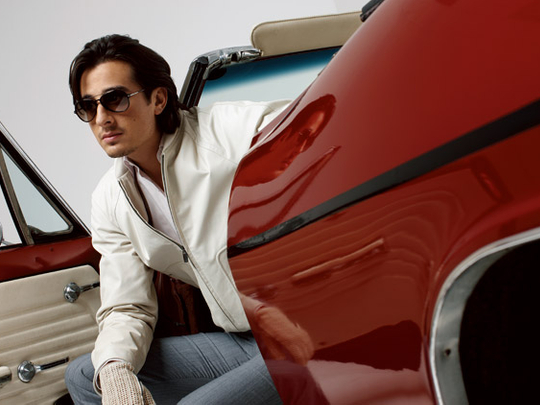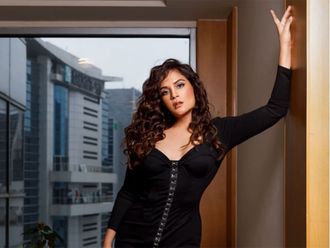
Ali Mostafa wears Dunhill on this shoot.
All clothes available at Dunhill boutiques, Dubai Festival City and Dubai Mall Image Credit: Stylist: Farah Kabir, Photographer Kishore Kumar/ANM
Ali Mostafa is sitting alone in a quiet corner of Neos at
"What do I talk about?" he asks calmly, when I approach. "I'm going on in five minutes and I have nothing prepared."
I suggest he talks about the influence of his family on his career. Gushing parental gratitude, the old "I could never have done this alone" spiel… it works a treat at the Oscars. He nods and I leave him to gather his thoughts.
Half an hour later, after a flawless performance delivered in the unwavering manner of a seasoned after-dinner speaker, he bounds up and asks a colleague from my work and me how we think it went. We laugh, conspiringly. He knew exactly what he was going to say all along, right? The "I have nothing prepared" plea wasa cunning ruse in case anything went wrong. "No, I swear I didn't plan any of it," he says. "Not a word." And it's not until we meet several weeks later at a café in Mercato mall that I start to believe him.
For our interview, Mostafa turns up a few minutes late, looking smart but casual in a shirt and jeans. He's on his cellphone, being informed, it soon transpires, that the wallet he lost at an event the night before has been found by a friend. Not that he seems remotely flustered. Mostafa doesn't do flustered. Ever. Not on a film set. Not when giving a talk to an assembly of journalists without any preparation. Not when all his credit cards could, at this very second, be getting maxed out by a wallet thief in Bloomingdale's.
We're indoors but he's wearing shades, movie star-style. I suspect it's because he's trying to retain some kind of anonymity in a city where he is frequently recognised (although, on the contrary, the shades make him slightly more conspicuous). I ask him how his life has changed since the release of City of
"It's changed dramatically," he says. "Being recognised in weird places is something I'll never get used to, or like. But sometimes it's nice, like when someone is being pleasant. In the
The reason the anniversary has slipped his mind is perhaps because he's already making headway on his next movie, an "adventure-comedy-drama" which he's hoping to begin shooting late this year. From A to B (its working title) is about four twenty-something friends from across the Arab world who go on a road-trip from Abu Dhabi, where they went to school together, to Beirut. The movie, he says, will be mainly in English.
"Quite a bit of it is going to be shot guerrilla-style. This film will have much more of an indie feel than City of
"This is literally just four guys who go on a road trip. But the cast is large in terms of cameos. They're going to be bumping into a lot of people along the way."
He admits it has been easier to get cast and crew involved the second time around.
"Before it was, ‘Who on earth is Ali Mostafa?' Now it's "Ok, so Ali Mostafa knows how to make a movie," he says.
For those who have seen City of
He has also been in talks with Lowkey,a British-Iraqi rapper, about a role. "He has a huge following in the
"I'm trying to find the fourth, who will probably be based in
A long-time hip-hop aficionado, he says he chooses rappers to act in his movies because he loves the idea of translating their stage presence to the cinema screen. And it's hard to find fault with this approach. As the wise-cracking Khalfan, reckless and courageous in equal measure, The Narcicyst is arguably the most memorable character in City Of
Asked why he chose to make a road-trip movie, Mostafa admits to loving them and says he's been toying with the idea of making one for a while.
"I think a lot of people like them.I think they're very successful because a lot of people don't get the chance to do crazy things like go on a road trip and the audience can find escapism by watching other people do crazy things. I've always had the idea of making a movie like this and when The Hangover came out and did ridiculously well, I thought, ‘how can I make this idea my own?'"
Unlike City of
I ask him what he thinks about the recent controversy surrounding the making of Djinn. Disappointed by the lack of home-grown involvement, Emirati director Nayla Al Khaja quit the set of the Tobe Hooper-helmed horror film, which is being made in the UAE by
"I fully support anyone who takes the decision that they feel is right for them," he says. "I don't know the full story. But what I do know is that if she felt uncomfortable then that's her right."
I sense he isn't totally comfortable talking about Nayla, a good friend of his, and he deflects the question by half-jokingly pointing out that horror film sets are rarely harmonious. "They can be strange places. I had experience as a kid of working on a horror film and lights would pop, there'd be power cuts… weird things would happen. You're always going to find some kind of agro on a horror film set. But regardless of whether the film is an Emirati production, Western, whatever, as long as films are being made here it's helping people like us.
"That's what matters to me… that infrastructure is improving, more experienced people are getting involved. This is what we need. We're not going to grow if we do only one film a year."
We talk a little of the film-making process and which part of it he enjoys the most. He says he prefers directing to writing. He hates solitude. He's a people person, perhaps owing to the fact that he grew up in a big family with two younger brothers and an older sister. "If they could invent a tool so that what goes on in my head goes straight onto the paper I would be set," he says. "I hate writing."
When I remind him of something I told him at the 4men fashion shoot about Quentin Tarantino needing several lifetimes to tell the stories that are in his head, he says he feels the same way and jokes that he needs "a team ofAli Mostafa clones."
At the same shoot he mentioned wanting to make a biopic of "a major historical figure", refusing to elaborate on his or her identity. I ask him whether it is the late Shaikh Zayed Bin Sultan Al Nahyan, but his lips are sealed, my protestations about being able to keep a secret futile. "No. I can't say anything until I get the blessing from someone."
Is it an Asian despot? A Roman emperor? The Facebook revolutionary, Wael Ghonim? Can he at least tell me if it's a worldwide household name?
"They could be," he says, laughing. And with that he gets up, bids farewell and merges into the shoppers at Mercato Mall, oblivious to two youths in dishdashas doing a double take as he a passes them. That sunglasses disguise? It definitely doesn't work.












